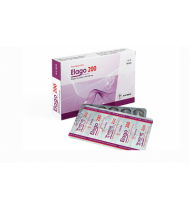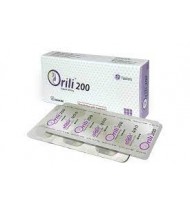Elagolix
Indications
Elagolix is indicated for the management of moderate to severe pain associated with endometriosis.
Pharmacology
Endometriosis develops when tissue that is similar to the kind that is normally located in the uterus starts to grow outside of the uterus. Such growth leads to various symptoms like pain during periods, pelvic pain between periods, and pain during sexual intercourse. The growths themselves are referred to as lesions and frequently develop on the ovaries, fallopian tubes, and other areas around the uterus, including the bowel or bladder. The growth of these lesions is dependent upon the estrogen hormone.
Elagolix is an orally-administered, nonpeptide small molecule gonadotropin-releasing hormone (GnRH) receptor antagonist that inhibits endogenous GnRH signaling by binding competitively to GnRH receptors in the pituitary gland Label. Administration of elagolix results in dose-dependent suppression of luteinizing hormone (LH) and follicle-stimulating hormone (FSH), leading to decreased blood concentrations of the ovarian sex hormones, estradiol and progesterone.
Elagolix is an orally-administered, nonpeptide small molecule gonadotropin-releasing hormone (GnRH) receptor antagonist that inhibits endogenous GnRH signaling by binding competitively to GnRH receptors in the pituitary gland Label. Administration of elagolix results in dose-dependent suppression of luteinizing hormone (LH) and follicle-stimulating hormone (FSH), leading to decreased blood concentrations of the ovarian sex hormones, estradiol and progesterone.
Dosage & Administration
Exclude pregnancy before starting Elagolix or start Elagolix within 7 days from the onset of menses. Take Elagolix at approximately the same time each day, with or without food.
Initiate treatment with Elagolix 150 mg once daily-
Initiate treatment with Elagolix 150 mg once daily-
- Maximum Treatment Duration: 24 months
- Coexisting Condition: None
- Maximum Treatment Duration: 6 months
- Coexisting Condition: Dyspareunia
- Maximum Treatment Duration: 6 months
- Coexisting Condition: Moderate hepatic impairment (Child-Pugh Class B)
Contraindications
Elagolix is contraindicated in women:
- Who are pregnant
- Exposure to ORILISSA early in pregnancy may increase the risk of early pregnancy loss.
- With known osteoporosis because of the risk of further bone loss
- With severe hepatic impairment because of the risk of bone loss
- With concomitant use of strong organic anion transporting polypeptide (OATP) 1B1 inhibitors (e.g., cyclosporine and gemfibrozil)
Side Effects
Most common adverse reactions (>5%) in clinical trials included hot flushes and night sweats, headache, nausea, insomnia, amenorrhea, anxiety, arthralgia, depression-related adverse reactions and mood changes.
Pregnancy & Lactation
Exposure to Elagolix early in pregnancy may increase the risk of early pregnancy loss. Use of Elagolix is contraindicated in pregnant women. Discontinue Elagolix if pregnancy occurs during treatment. The limited human data with the use of Elagolix in pregnant women are insufficient to determine whether there is a risk for major birth defects or miscarriage. Although two cases of congenital malformations were reported in clinical trials with Elagolix, no pattern was identified and miscarriages were reported at a similar incidence across treatment groups. There is no information on the presence of elagolix or its metabolites in human milk, the effects on the breastfed child, or the effects on milk production.
There are no adequate animal data on the excretion of Elagolix in milk. The developmental and health benefits of breastfeeding should be considered along with the mother’s clinical need for Elagolix and any potential adverse effects on the breastfed child from Elagolix.
There are no adequate animal data on the excretion of Elagolix in milk. The developmental and health benefits of breastfeeding should be considered along with the mother’s clinical need for Elagolix and any potential adverse effects on the breastfed child from Elagolix.
Precautions & Warnings
- Bone Loss: Dose- and duration-dependent decreases in bone mineral density (BMD) that may not be completely reversible. Assess BMD in women with additional risk factors for bone loss
- Reduced Ability to Recognize Pregnancy: Elagolix may alter menstrual bleeding, which may reduce the ability to recognize pregnancy. Perform testing if pregnancy is suspected. Discontinue if pregnancy is confirmed
- Suicidal Ideation and Mood Disorders: Advise patients to seek medical attention for suicidal ideation, suicidal behavior, new onset or worsening depression, anxiety, or other mood changes
- Hepatic Transaminase Elevations: Dose-dependent elevations in serum alanine aminotransferase (ALT). Counsel patients on signs and symptoms of liver injury
- Potential for Reduced Efficacy with Estrogen-Containing Contraceptives: Use non-hormonal contraception during treatment and for one week after discontinuing Elagolix.
Use in Special Populations
- No dose adjustment of Elagolix is required in women with any degree of renal impairment or end-stage renal disease (including women on dialysis)
- No dosage adjustment of Elagolix is required in women with mild hepatic impairment.
- Safety and effectiveness of Elagolix in patients less than 18 years of age have not been established.
Therapeutic Class
Gonadotropin-releasing hormone (GnRH) antagonist
Storage Conditions
Keep below 30°C temperature, away from light & moisture. Keep out of the reach of children.
Elago Tablet 200mg
IndicationsElagolix is indicated for the management of moderate to severe pain associated with endom..
235.00Tk.
Orili Tablet 200 mg
IndicationsElagolix is indicated for the management of moderate to severe pain associated with endom..
235.00Tk.
Showing 1 to 2 of 2 (1 Pages)


